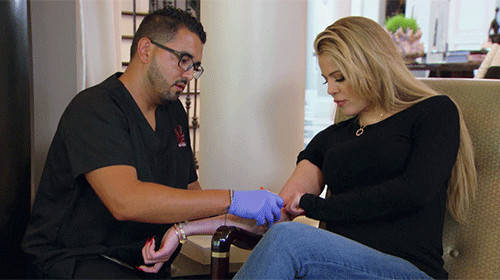 While general information on breast cancer shows up in mainstream media all the time, it’s pretty rare that genetic testing and the breast cancer geneA sequence in the DNA which can be passed down from parent to child. Genes helps determine physical and functional traits for the body. BRCA are discussed. That’s why we were excited when we heard that the reality show Keeping Up With The Kardashians dedicated a whole episode to it last year.
While general information on breast cancer shows up in mainstream media all the time, it’s pretty rare that genetic testing and the breast cancer geneA sequence in the DNA which can be passed down from parent to child. Genes helps determine physical and functional traits for the body. BRCA are discussed. That’s why we were excited when we heard that the reality show Keeping Up With The Kardashians dedicated a whole episode to it last year.
In the episode “Fear of the Unknown,” Kris talks to her daughters about getting geneticInherited characteristics. testing since their grandmother has a history of cancer. While Kim and Kourtney agree, their sister Kloé is resistant, saying she’d rather not know. In the end, the girls and their mother get their blood drawn and their (negative!) results are reviewed with their family friend, a plastic surgeon.
While we love Kim’s desire to help her daughters get the facts so better early detection and cancer prevention strategies can be used, the process left a bit to be desired on the medical end. How could have the testing been improved? Here’s what we think should have happened instead.
Involve A Genetic Counselor
Speaking with a Genetic Counselor before you get a test is the best way to find out if you are a good candidate. Test results from genetic tests like the BRCA1 and BRCA2 tests are complicated and it’s important that a Genetic Counselor help you understand the results. These highly trained medical professionals have specialized training and have Masters in Human Genetics. Based on your test, a Genetic Counselor will create a personalized risk assessment for you to help you understand your options. They also have extensive experience dealing with the emotions and anxiety surrounding results, both negative and positive. If your test results are positive, a good Genetic Counselor can help you formulate a early detection strategy that is unique to your risk level. Genetic Counselors can also help you determine which family members, if any, might benefit from counseling and testing.
Test the Right Person
In the episode, we learn that the girls’ grandmother (Kris’s mother) has battled cancer, but besides Kloé’s brushes with cancerous moles (skin cancer), no one in the show has had cancer. To get the full benefit of hereditary genetic testing, though, the best option is to test the family member who has had cancer. If their grandmother received a positive result, then Kris could have been tested, and then her children if Kris’s results were positive. Testing multiple generations at once is rarely the best option, especially if none of them are survivors.
No One Should Be Pressured Into a Test
As Kloé repeatedly makes clear, she is extremely stressed about having the test. Genetic tests are deeply personal and the results of these tests have wide-ranging life-long mental health effects. If you have strong emotions about taking a genetic test, get genetic counseling. Make sure you fully understand the pros and cons, and then make an unbiased educated decision. And never pressure a loved one into a medical procedure they aren’t ready for!
Do you have questions about genetic testing or want to understand your personal level of risk better? Talk to your doctor or get a referral to a Genetic Counselor and find out if testing is right for you and your family.